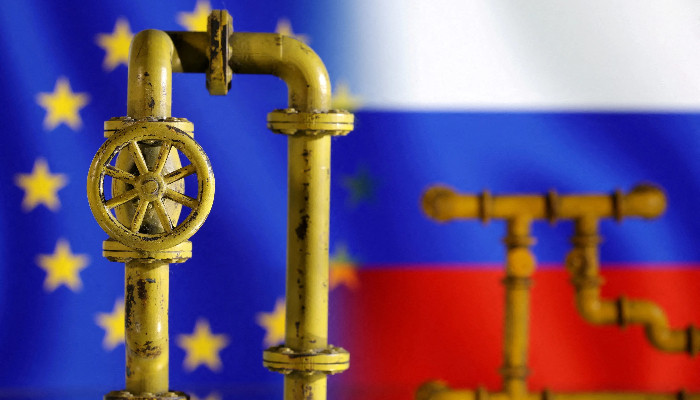Russian gas continues to flow to Europe, despite sanctions
 3072 Monday, 20 January, 2025, 20:49 In 2024, Europe imported more Russian liquefied natural gas than ever before - despite increased efforts by the EU to reduce gas imports from Russia. And in the middle of it all: Switzerland as an important distribution location. The office is inconspicuous, even though it is in a prominent location in Zug city centre. Directly opposite Coop City, next to the Balmer bookstore, is the headquarters of Novatek Gas & Power GmbH. Passers-by are unlikely to notice the small company sign, and the company name probably doesn't ring a bell either. But Novatek is a giant in its sector. After Gazprom, the company is the second largest gas exporter in Russia, but, unlike Gazprom, which was an official UEFA sponsor before the war in Ukraine and whose name adorned the shirts of numerous European football clubs, Novatek is hardly known to the local public. Various subsidiaries of Novatek have been active in Switzerland since 2005. These were merged into Novatek Gas & Power GmbH in 2012, with the aim of bringing the parent company's main export product to European customers. Liquefied Natural Gas, or LNG for short Zug-based Gazprom subsidiary is in liquidation The company is also struggling in Switzerland. The Zug-based operator of the Nord Stream 2 Baltic Sea pipeline, which is majority-owned by Gazprom, is largely unable to act as a result of the sanctions, and is facing bankruptcy. Due to the geopolitical implications of the case, the definitive debt-restructuring moratorium was extended once again last week, until the 9th May 2025, by a Zug court in an extraordinary procedure. Prime location: Novatek Gas & Power GmbH headquarters on the Bundesplatz in Zug Photo: Stefan Kaiser The sister company Nord Stream 1 is also less busy than before, and has had to make redundancies due to its declining revenues. The Swiss branch of the Gazprom Group, which is located near the Zug government building (Regierungsgebäude), and which last traded under the name Sefe Switzerland, has been in liquidation since October 2024. Liquid gas has replaced the sanctioned pipeline gas According to the Finnish Centre for Research on Energy and Clean Air (Crea), the EU imported Russian LNG worth € 7.3 billion last year; the volume thereby increased by 14% to 17.5 million tons compared to the previous year. Belgium and Spain recently imported more Russian LNG than before the start of the war, and France has become Russia's most important LNG buyer, according to Crea. Russian liquefied natural gas is thereby replacing an increasingly large proportion of the sanctioned pipeline gas, and Russia recently overtook Qatar as Europe's second-largest LNG supplier, behind the USA. This is mainly because Russian liquefied natural gas was comparatively cheaper on the spot markets. Novatek is accordingly preparing for the new gas future. The billion-euro Arctic LNG 2 project, for example, is currently under construction on the Gyda peninsula in western Siberia, and will supply an additional 20 million tons of liquefied gas to the world every year from 2026. The French company Total Energies has a 10% stake in the project, which illustrates one thing above all: Novatek can count on Europe for its future expansion plans. In December, the company was actually invited to an international LNG industry meeting in Berlin, where it was able to promote its product - which earned criticism for the German organisers. It was not the gas giant's parent company that was represented, however, but its Singapore subsidiary Novatek Gas & Power Asia, which also has a branch office in Zug without a physical address. Zug's finance director has reacted to criticism The head of the Novatek parent company in Moscow is the Russian oligarch Leonid Mikhelson, who, according to EU sanctions regulations, is a close confidant of Vladimir Putin, without actually being on a sanctions list himself. In addition to Gazprom, the USA has now also placed sanctions on the Novatek Group and its flagship project Arctic LNG 2. In the EU, on the other hand, Novatek has so far managed to avoid sanctions - which is likely due, in part, to the involvement of French company Total Energies in Arctic LNG 2. Even though the EU began sanctioning cargo ships carrying Russian LNG last year, it is not planning to become independent of gas imports from Russia until 2027. Until then, the gas rouble will continue to roll, including in Zug. The Green Alternative party (ALG) in Zug, among others, has criticised the canton for being ‘partly responsible for the war in Ukraine’ with its passivity towards non-transparent Russian companies. Zug's Director of Finance, Heinz Tännler, recently replied to the Swiss SRF television company, saying that such companies could not simply be driven out of the canton. ‘If they comply with the law, and if they comply with the constitution, then they have the right to have a domicile here.’ The Novatek company itself could not be reached for comment. |

Trump says Board of Peace members pledged over $5B for Gaza
436Yesterday, 21:39
EU plans crypto ban for Russia, FT reports
178411.02.2026, 00:48
US Treasury Secretary says US sanctions crushed Iran’s economy and sparked protests (video)
289406.02.2026, 10:43
Elon Musk just became the first person ever worth $800 billion after SpaceX acquired xAI
303304.02.2026, 18:30
Xi Jinping calls for China’s renminbi to attain global reserve currency status
428801.02.2026, 23:05
Trump signs order allowing US to impose tariffs on countries supplying oil to Cuba
430830.01.2026, 12:17
EU Adds Russia to High-Risk Money Laundering List Strengthening Financial Controls
419630.01.2026, 00:37
Bessent says disappointed by EU-India deal; South Korea must ratify trade deal
441728.01.2026, 23:20
